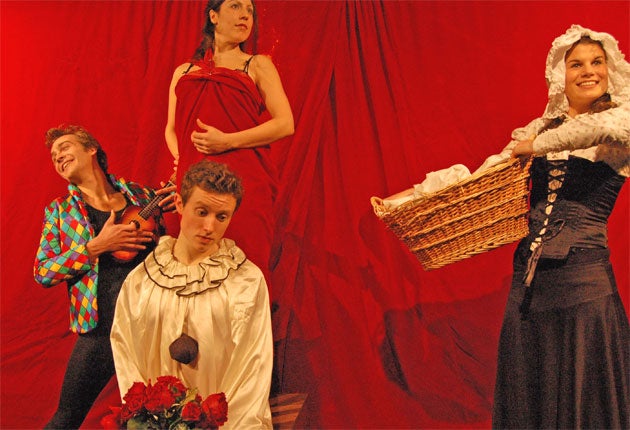France brings in film school for <i>les enfants</i>
Watching classics like 'Citizen Kane' will help pupils understand real-life power struggles

Your support helps us to tell the story
From reproductive rights to climate change to Big Tech, The Independent is on the ground when the story is developing. Whether it's investigating the financials of Elon Musk's pro-Trump PAC or producing our latest documentary, 'The A Word', which shines a light on the American women fighting for reproductive rights, we know how important it is to parse out the facts from the messaging.
At such a critical moment in US history, we need reporters on the ground. Your donation allows us to keep sending journalists to speak to both sides of the story.
The Independent is trusted by Americans across the entire political spectrum. And unlike many other quality news outlets, we choose not to lock Americans out of our reporting and analysis with paywalls. We believe quality journalism should be available to everyone, paid for by those who can afford it.
Your support makes all the difference.As education initiatives go, it's one that's unlikely to elicit any groans or eye-rolling from the pupils. All secondary schools in France have been ordered to screen classic films – from Orson Welles' Citizen Kane to François Truffaut's Les Quatre Cent Coups (The 400 Blows) – in a bid to expand children's knowledge of the so-called "septième art" (seventh art).
While ciné-clubs were all the rage in post-war France, their popularity waned as commercial cinemas grabbed more and more terrain. Now they are set for a grand revival. However, instead of being organised by cinematic legends, as they were in the 1940s when New Wave great Eric Rohmer presided over a club in the Parisian Latin Quarter and Truffaut held court at Cercle Cinémane, they will be run by a combination of teachers and pupils.
"We teach literature, music and theatre at school, and we believe it is essential that cinema be taught as well," said Costa Gavros, president of Paris's Cinémathèque film archive. "It is absolutely vital, especially because images play such a role in our society. It is very important that young people learn to detect and decode images."
The initiative, Cinélycée, will launch in September. A member of staff from each school will sign up to be the resident "culture tsar" – a position for which they will be paid extra – and will sit alongside five students on a mini film council. It is part of a wider reform of the secondary school system promoted last year by President Nicolas Sarkozy, who believes France's rich cinematic heritage is being sidelined by modern, celebrity-heavy fare.
"We live in an unlikely and dangerous situation, where the culture of cinematography for our pupils seems inversely proportional to the quantity – which is immense – of images and videos that they consume each day," the President said last year. "It is urgent to develop their critical regard, and anchor their relationship with the moving image in a culture heritage."
Under the plans, unveiled yesterday, each school will have its own club with a repertoire of 200 films. They will include masterpieces from the silent movie era, as well as British, Italian, American and Asian films, and such homegrown chef d'oeuvres as Marcel Carné's Les Enfants du Paradis and Jean Renoir's La Grande Illusion.
"The films can be used either during literature classes or during history classes, and then outside of teaching hours," education minister Luc Chatel told French radio. Pupils will be able to vote online for the films they wish to see in their school, reserve seats at screenings and invite parents and friends along. Afterwards they will be encouraged to discuss what they have seen.
All the films in the school archive are pre-1980 and are intended to be watched alongside current releases. Schools will be expected to screen films – either streamed live or downloaded – several times a month in their original languages with subtitles. In a bid to stop piracy, only 20 films will be on offer each month.
For Frédéric Mitterrand, the minister for culture, screening film classics in the classroom is not just about developing pupils' cinematic knowledge but also educating them about the reality of the 21st century, by exposing them to a whole range of human emotion. "Citizen Kane is a remarkable film for understanding the machinations of power, the machinations of ambition," Mr Mitterand said yesterday.
"You can compare it with contemporary figures who are ambitious, who want to achieve something, and you have an absolutely extraordinary means of understanding them," he added.
On the curriculum
Citizen Kane (Orson Welles)
The 1941 film, starring Welles as Charles Foster Kane, depicts the scramble by newspaper reporters to interpret the meaning of the media tycoon's last word: Rosebud. Frequently voted best film ever, it won an Academy Award for its screenplay written by Welles and Herman Mankiewicz.
La Grande Illusion (Jean Renoir)
This film examines class relationships between French officers planning their escape from a prisoner-of-war camp. After it won best artistic ensemble at the 1937 Venice Film Festival, Joseph Goebbels described it as "cinematic public enemy no 1".
Les Quatre Cent Coups (François Truffaut)
Semi-autobiographical, the movie tells the story of schoolboy Antoine Doinel, played by Jean-Pierre Léaud. It won the best director award at the 1959 Cannes Film Festival.
Les Enfants du Paradis (Marcel Carné)
Made during the Nazi occupation of France, this film depicts the behind-the-scenes love intrigues at a 1830s theatre.
Join our commenting forum
Join thought-provoking conversations, follow other Independent readers and see their replies
Comments